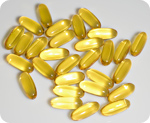
Major Study Finds Good News About Vitamins E and C
Monday, August 13, 2007 by: Jack Challem
Tags: antioxidants, nutrition, vitamin E
Most Viewed Articles
Today
Week
Month
Year
- Newly released JFK files reveal Pentagon's role in creating Lyme disease and covid in the same lab
- Woman contracts WORLD'S DEADLIEST VIRUS after unknowingly being given the WRONG VACCINE
- Kiss Your Genetic Privacy Good-Bye! 23andMe Gets Green Light to Sell Your Intimate Genetic Details to Anyone They Want
- AI weather model outperforms traditional forecasts, boosts accuracy by 20%
- Sweden's migrant crisis deepens as failed green energy venture leaves thousands jobless, exposes systemic collapse
- Revolutionize your diet with pomegranate: The miracle juice for gut health and metabolism
- Advisory: Ex-FBI agent exposes likely ATF honeypot operation selling illegal Glock switches
- The case for locking up the Deep State's biggest hatchet man...
- Pediatric dentist exposes fluoride dangers as more states ban toxic water additive
- Analysis: The coming economic collapse, a mass uprising and Trump's three secret weapons to halt the growing revolt
- North Carolina Supreme Court rules family can sue over COVID-19 force-vaccination of teen without parental consent
- Could camel milk be a game-changer for autism? Science says it’s worth exploring
- DHS Secretary Kristi Noem plans to dismantle FEMA
- At least 75 percent of Americans are unknowingly MEDICATED FOR STUPIDITY by fluoridated water – Utah now banning it
- U.K. unveils controversial pandemic preparedness tool: A double-edged sword?
- NIH to crack down on taxpayer-funded censorship: A victory for academic freedom
- Ann Vandersteel on the Health Ranger Report: Operation Burning Edge, the dollar empire’s collapse and the rebirth of America’s sovereignty
- We are closer to all-out war in Europe, in Asia, and in the Middle East than most people realize
- Newly released JFK files reveal Pentagon's role in creating Lyme disease and covid in the same lab
- Analysis: The coming economic collapse, a mass uprising and Trump's three secret weapons to halt the growing revolt
- Trump nominates VACCINE ZEALOT Susan Monarez to lead the CDC, sidelining RFK Jr.'s reform efforts
- Trump's greatest betrayal so far: Accelerating Middle East wars, silencing dissent, and serving Zionist masters
- CDC finally halts $11 billion COVID funding scam as health officials admit the ‘pandemic’ was a fraud
- The hidden dangers in your kitchen: How cooking methods impact diabetes, cancer and aging
- BEWARE: USDA allows genetically engineered vaccines to infiltrate organic food production
- Obama accused of laundering USAID funds to fuel global protest movements, regime change operations
- DEADLY DECEPTION: How COVID vaccines increased mortality rates and why authorities hid the truth
- Here are TEN all-natural ways to protect your garden without using harmful chemicals
- Dr. Mike Yeadon releases 15-minute testimony - WATCH - about genocidal intent of COVID “vaccines”
- Festive flavors: The sweet history, nutritional profile and health benefits of pecan pie
- Big Pharma's media takeover: How drug companies bought the news - and your health
- Dr. Suzanne Humphries makes bombshell appearance on Joe Rogan podcast, exposing vaccine industry deception back to POLIOMYELITIS
- Elon Musk: Aliens could be here on Earth RIGHT NOW
- 5 Simple steps to boost your brainpower: How to strengthen executive function in a distracted world
- Trump reverses course on Gaza plan, says “nobody is expelling Palestinians”
- California's social media censorship law struck down: A victory for free speech or a threat to online safety?
- Newly released JFK files reveal Pentagon's role in creating Lyme disease and covid in the same lab
- EPA advisor admits the agency is funneling billions to climate groups ahead of Trump’s return to White House
- California's social media censorship law struck down: A victory for free speech or a threat to online safety?
- Dr. Mike Yeadon releases 15-minute testimony - WATCH - about genocidal intent of COVID “vaccines”
- The Health Ranger releases “Vaccine Zombie” song and music video, using AI-animated zombies for the music video
- Florida takes a stand: DeSantis proposes permanent ban on mRNA vaccine mandates
- The pandemic as a tool for INDOCTRINATION: Understanding “The Indoctrinated Brain” by Dr. Michael Nehls
- “Why we influenced the 2020 elections”: Facebook files reveal the coordinated effort to bury the Hunter Biden laptop story
- Mike Adams releases country western hit single: Goin’ Back in Time is Comin’ Home
- Mike Adams releases music poetry sensation: A Child of God
- Unpacking the Lies That We’ve Been Fed – new song and music video released by Mike Adams, the Health Ranger
- Michigan sheriff announces criminal investigation into 2020 election crimes, Dominion Voting Systems
- Migrants are taking advantage of recent hurricanes to scam residents and loot their homes
- House Intelligence Committee calls for the ARREST and PROSECUTION of Dr. Anthony Fauci
- Rep. Nancy Mace introduces bill to ban biological males from female facilities on federal property
- Peter Rost exposes Big Pharma corruption in his book “The Whistleblower: Confessions of a Healthcare Hitman”
- Former horse rancher and 6,000 other plaintiffs are suing Syngenta after paraquat exposure led to Parkinson's Disease
- Mike Adams releases new song and music video: Nothing More Disgusting Than a Globalist
- Red Cross issues warning to stop blood plasma donations from vaccinated people
- Scientists confirm: GENIUS brain function can be spontaneously unleashed in humans without any apparent cause
- EPA advisor admits the agency is funneling billions to climate groups ahead of Trump’s return to White House
- HYSSOP: What research reveals about the health benefits of this ancient holy herb
- Two containers with completed ballots fall out of truck in Florida
- Fully vaccinated about to see “tsunami” of illness and death, warns virologist
- Global leaders unite to clamp down on “misinformation” with UN-backed Cascais Declaration
- BREAKING: 2025 NDAA authorizes mandatory military draft of WOMEN across America… as Pentagon pursues global NUCLEAR war with both Russia and China at the same time
- Michael Yon warns of a ZIONIST TAKEOVER in Trump’s second administration
- BOMBSHELL: DNA testing kits are a SCAM to develop ethnic-specific bioweapons
- Ozempic and Wegovy weight loss drugs are injectable LIZARD VENOM PEPTIDES that may unleash a devastating wave of organ failure… side effects align with symptoms of SNAKE BITES
- Israeli soldiers accused of even more torture and abuse in the West Bank
- These 13 countries just signed an agreement to engineer a global FAMINE by destroying food supply
- NASA admits that climate change occurs because of changes in Earth’s solar orbit, and NOT because of SUVs and fossil fuels
- RFK Jr. clears key hurdle: Sen. Susan Collins backs controversial HHS nominee, signaling a new era for health policy
- Sermon 30: How Jesus reveals Caesar’s FAKE CURRENCY and FALSE AUTHORITY
- Coriander seeds: Ancient medicine backed by modern science
- Arizona officials claim Maricopa County needs 10-13 days to tabulate results of the election
A new study has found that natural vitamin E and vitamin C can significantly reduce the risk of several cardiovascular diseases. The study was published in the August 13, 2007, issue of Archives of Internal Medicine, a journal published by the American Medical Association.
Nancy R. Cook, ScD, of the Harvard School of Public Health, and her colleagues asked 8,171 women to take 600 IU of natural-source vitamin E, 500 mg of vitamin C, and 50 mg of beta-carotene, or various combinations of these antioxidant nutrients every other day for an average of nine and one-half years.
When Cook and her colleagues analyzed data from people who consistently took their supplements, they found these specific benefits:
• Vitamin E led to a 22 percent reduction in the risk of heart attack.
• Vitamin E led to a 27 percent less risk of stroke.
• Vitamin E led to a 9 percent lower risk of death from cardiovascular disease.
• Vitamin E led to a 23 percent lower combined risk of heart attack, stroke, and cardiovascular-related death.
• Vitamin E and vitamin C together lowered the risk of stroke by 31 percent.
Despite these positive findings, initial newspaper and television reports on the study tended to be negative, stating that the benefits were marginal or that there were no benefits at all. The negative media spin originated with a news release from Brigham Women's Hospital in Boston, where the research was conducted, as well as from a news release from the American Medical Association.
The researchers reported that, overall, vitamin E supplements led to a "marginally significant" 11 percent lower risk of combined cardiovascular disease events, including heart disease and stroke.
But when the researchers analyzed results from people who consistently took their supplements, the found the "stronger" benefits.
Including people who infrequently took supplements with those who consistently took them diluted the overall findings. However, focusing only on people who regularly took supplements strengthened the findings and benefits of vitamin E and antioxidants.
Beta-carotene did not have any clear cardiovascular benefits, and the researchers also pointed out there were no signs of harm from any of the supplements. Other studies have pointed out that beta-carotene may have benefits in preventing cancer among people who do not eat many fruits and vegetables.
Nancy R. Cook, ScD, of the Harvard School of Public Health, and her colleagues asked 8,171 women to take 600 IU of natural-source vitamin E, 500 mg of vitamin C, and 50 mg of beta-carotene, or various combinations of these antioxidant nutrients every other day for an average of nine and one-half years.
When Cook and her colleagues analyzed data from people who consistently took their supplements, they found these specific benefits:
• Vitamin E led to a 22 percent reduction in the risk of heart attack.
• Vitamin E led to a 27 percent less risk of stroke.
• Vitamin E led to a 9 percent lower risk of death from cardiovascular disease.
• Vitamin E led to a 23 percent lower combined risk of heart attack, stroke, and cardiovascular-related death.
• Vitamin E and vitamin C together lowered the risk of stroke by 31 percent.
Despite these positive findings, initial newspaper and television reports on the study tended to be negative, stating that the benefits were marginal or that there were no benefits at all. The negative media spin originated with a news release from Brigham Women's Hospital in Boston, where the research was conducted, as well as from a news release from the American Medical Association.
The researchers reported that, overall, vitamin E supplements led to a "marginally significant" 11 percent lower risk of combined cardiovascular disease events, including heart disease and stroke.
But when the researchers analyzed results from people who consistently took their supplements, the found the "stronger" benefits.
Including people who infrequently took supplements with those who consistently took them diluted the overall findings. However, focusing only on people who regularly took supplements strengthened the findings and benefits of vitamin E and antioxidants.
Beta-carotene did not have any clear cardiovascular benefits, and the researchers also pointed out there were no signs of harm from any of the supplements. Other studies have pointed out that beta-carotene may have benefits in preventing cancer among people who do not eat many fruits and vegetables.
About the author
The Nutrition Reporter newsletter publishes summaries of recent research on vitamins, minerals and other nutrients. For sample issues, visit www.nutritionreporter.com or send a self-addressed envelope with two first-class stamps to: The Nutrition Reporter, PO Box 30246, Tucson AZ 85751. Subscriptions are $27 per year. Jack Challem, editor of the newsletter, is considered one of America's most trusted health and nutrition writers. For free excerpts of his book, The Food-Mood Solution, visit www.foodmoodsolution.com.Follow real-time breaking news headlines on
Antioxidants at FETCH.news
Antioxidants at FETCH.news
Receive Our Free Email Newsletter
Get independent news alerts on natural cures, food lab tests, cannabis medicine, science, robotics, drones, privacy and more.
Take Action: Support Natural News by linking to this article from your website
Permalink to this article:
Embed article link: (copy HTML code below):
Reprinting this article:
Non-commercial use OK, cite NaturalNews.com with clickable link.
Follow Natural News on Facebook, Twitter, Google Plus, and Pinterest
Natural News Wire (Sponsored Content)
Science.News
Science News & Studies
Science News & Studies
Medicine.News
Medicine News and Information
Medicine News and Information
Food.News
Food News & Studies
Food News & Studies
Health.News
Health News & Studies
Health News & Studies
Herbs.News
Herbs News & Information
Herbs News & Information
Pollution.News
Pollution News & Studies
Pollution News & Studies
Cancer.News
Cancer News & Studies
Cancer News & Studies
Climate.News
Climate News & Studies
Climate News & Studies
Survival.News
Survival News & Information
Survival News & Information
Gear.News
Gear News & Information
Gear News & Information
Glitch.News
News covering technology, stocks, hackers, and more
News covering technology, stocks, hackers, and more













































